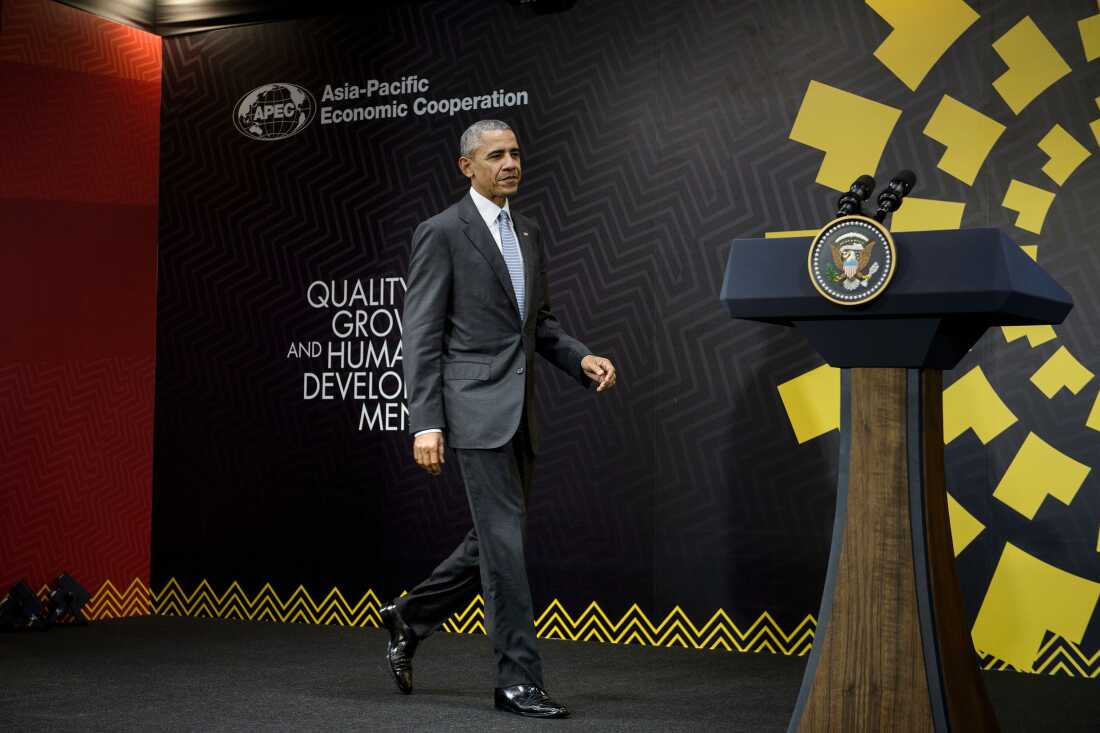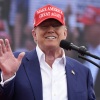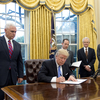Trump is back: how Biden will tweak his ‘America’s back’ message at APEC and the G20

In this file photo from last year’s G20 meeting in New Delhi on Sept. 9, 2023, President Biden speaks with Saudi Crown Prince Mohammed bin Salman and India’s Prime Minister Narendra Modi
Evelyn Hockstein/AFP
hide caption
toggle caption
Evelyn Hockstein/AFP
When President Biden travels to two major summits this week on the heels of Donald Trump’s victory in the presidential election, he faces a daunting challenge: reassuring world leaders that America remains committed to staying engaged in the world as his successor champions a go-it-alone approach.
Biden intends to meet with dozens of world leaders at the Asia-Pacific Economic Cooperation conference in Peru as well as the G20 summit in Brazil. In his valedictory turn on the world stage, he’s likely to face counterparts who question the U.S. commitment to alliances given Trump’s past skepticism of multilateral relationships.
“Biden will want to convey the message that America’s engagement with the world, American values, American interests are enduring,” said Evan Medeiros of Georgetown University’s School of Foreign Service, who led Asia policy in the Obama administration.
“But obviously that’s going to be exceptionally difficult to do because the rest of the world is now going to be looking to hedge the United States — in other words, reduce involvement — because America is unreliable and a risky partner,” Medeiros said.

President Biden walks from the stage after addressing the crowd on April 14, 2023 in Ballina, Ireland.
Leon Neal/Getty Images
hide caption
toggle caption
Leon Neal/Getty Images
America’s back – but for how long?
When Biden came into office, he sought to rebuild alliances strained during Trump’s first term, and tried to show that the United States remained engaged beyond its borders.
A month after his inauguration, Biden confidently declared, “America is back,” as he spoke to European leaders at the annual Munich Security Conference. “The transatlantic alliance is back,” he said. “And we are not looking backward; we are looking forward, together.” He often noted that world leaders were skeptical.
During his term, Biden strengthened and expanded NATO. He also worked to counter China in the Indo-Pacific by building up multilateral alliances in Asia. However, Republicans point to Biden’s disastrous withdrawal from Afghanistan as a foreign policy failure, and note that wars in Ukraine and the Middle East have dragged on.
Trump has a fundamentally different worldview than Biden. He has preferred bilateral meetings where he can try to cut deals one-on-one, and his commitment to NATO and backing Ukraine in its war with Russia is murky.
While Trump may have a different approach than Biden and more traditional Republican leaders, he is likely to continue to be engaged in global affairs, said Danielle Pletka, with the American Enterprise Institute, a conservative think-tank.
“The reality is that for many, many years now, we have had changes between Democratic administrations and Republican administrations,” Pletka said. “U.S. global leadership is based not simply on sentimental ideas about the beauty of NATO or about what great chardonnay we all get together at the G7,” she said.
“U.S. global leadership is based on the fact that we are the largest economy in the world,” Pletka said.

President Barack Obama arrives for a press conference after attending the Asia-Pacific Economic Cooperation summit on Nov. 20, 2016 in Lima, Peru.
Brendan Smialowski/AFP
hide caption
toggle caption
Brendan Smialowski/AFP
Obama faced a similar challenge at the end of his term
Still, Trump’s policies are likely to be very different from those espoused by Biden, putting the outgoing president in an awkward bind as he meets with world leaders this week.
In November 2016, former President Barack Obama was in a similar position, as he made a trip to Peru to meet APEC leaders following Trump’s first victory.
Obama had been trying to champion the Trans-Pacific Partnership, but Trump’s election spelled the end for that trade deal. “Obama’s main message in a lot of these meetings was, ‘You need to wait and see. We don’t know exactly what a Trump presidency is going to be like,'” said Ben Rhodes, who was Obama’s deputy national security adviser, and was on that trip.
“This time around, I think all these countries have their own theory of how they’re going to deal with Trump and, frankly, probably are less interested in what Joe Biden or his team has to tell them about that because they’ve lived through Trump once,” Rhodes said.

President Donald Trump meets with Turkish President Recep Tayyip Erdogan during the G20 Summit in Osaka on June 29, 2019.
Brendan Smialowski/AFP
hide caption
toggle caption
Brendan Smialowski/AFP
But Medeiros — who worked on Asia policy for Obama — noted that Asian allies fared better than European ones under the first Trump administration.
Trump launched the informal grouping known as the Quad — the U.S., Japan, India and Australia — and Biden elevated that relationship.
Biden also maintained Trump’s tariffs on China, for the most part. Trump has threatened to hike those once again.
It’s not clear whether Biden will meet with his Chinese counterpart Xi Jinping this week. But if he does, Biden should use that meeting to underscore that China needs to change its trade practices, not just threaten retaliation, said Danny Russel, a top State Department official in the Obama administration.
“I would look to Biden to make some practical points, because the likelihood of the Trump administration imposing tariffs is real,” said Russel, now with the Asia Society. “And that should be a clarion call to the big offenders like China that they need to adjust their policies and their practices.”
Related
What’s at stake for American culture with Trump’s Kennedy Center…
In her two decades as a human rights lawyer, working on issues in more than 25 countries, Hadar Harris says she is alarmed by what she's witnessing on U.S. soil
Denmark lost 52 soldiers fighting alongside the US. Now it…
Nick BeakeEurope correspondentBBCAll his adult life, Colonel Soren Knudsen stepped forward when his country called. And when its allies did.He fought alongside
As Trump upends foreign policy, Berkeley scholar sees irreparable damage…
Last week’s Oval Office blowup with Ukrainian President Volodymyr Zelensky exemplified what many foreign policy experts have long feared: that th
Trump creates a task force for the North American 2026…
President Donald Trump creates a task force to prepare for the 2026 W















